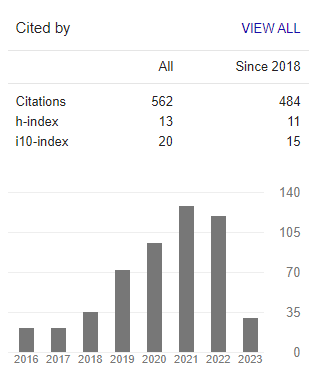PEWUJUDAN DAN PENYERAPAN PEMAIN DALAM VIDEO GAME
Abstract
In playing various video game, gamers unconsciously and automaticly embodied theirself inside the video game. The embodiment process are portrayed through icons, avatars and mostly their in-game characters, while the immersion happens during the process of playing, which can occur inside and outside of the video game. The playing intensity and the amount of time spend in playing video game determine the overall process of embodiment and immersion, beside the player sociocultural condition. This research uses ethnography to identify how gamers play the video game to fulfill their intrinsic needs such as competence, autonomy and relatedness.
To cite this article (7th APA Style):
Yuwono, A. I., Simatupang, G. R. L. L. & Salam, A. (2018). Pewujudan dan penyerapan Pemain dalam Video Game [Embodiment and Immersion of Players in the Game Video]. Journal Communication Spectrum, 8(1), 94-112. http://dx.doi.org/10.36782/jcs.v8i1.1837
Keywords
References
Aarseth, E. (2004). Genre Trouble: Narrativism and the Art of Simulation. Dalam: Wardrip-Fruin, N. & Harrigan, P (eds). First Person: New Media as Story, Performance, and Game. The MIT Press.
Biocca, F. (1997). The Cyborg's Dilemma: Progressive Embodiment in Virtual Environments. Journal Computer Mediated Communication, 3(2). https://doi.org/10.1111/j.1083-6101.1997.tb00070.x
Croteau, D. & Hoynes, W. (2003). Media Society (3rd Ed). Pine Forge Press.
Csikszentmihalyi, M. (1988). The Flow Experience and Its Significance in Human Psychology. Dalam Csikszentmihalyi, M. & Csikszentmihalyi, Is (eds). Optimal Experience: Psychological Studies of Flow in Consciousness. Cambridge University Press.
Csikszentmihalyi, M. (1988). The Future of Flow. Dalam Csikszentmihalyi, M. & Csikszentmihalyi, Is (eds). Optimal Experience: Psychological Studies of Flow in Consciousness. Cambridge University Press.
Csikszentmihalyi, M. (1991). Flow: The Psychology of Optimal Experience. Harper Perennial.
Gee, J. P. (2008). Video Games and Embodiment. Games and Culture, 3(3-4), 253-263)
Giddings, S. (2005). Playing with Non-Humans: Digital Games as Technocultural Form. Digital Game Research Conference (DiGRa), Vancouver, Canada, Juni 2005. https://www.researchgate.net/publication/221217520_Playing_with_non-humans_digital_games_as_technocultural_form
Gregersen, A. & Grodal, T. (2009). Video Games and Embodiment. Dalam: Perron, B. & Wolf, M (eds), The Video Game Theory Reader 2. Routledge.
Hall, S. (1980). Encoding/Decoding. Dalam Centre for Contemporary Cultural Studies (ed), Culture, Media, Language: Working Papers in Cultural Studies 1972-79 (hal. 128-138). Hutchinson
Haraway, D. (1991). Simians, Cyborgs, And Women: The Reinvention of Nature. Routledge.
Hsu, C-L. & Lu, H-P. (2004). Why Do People Play Online Games? An Extended Tam with Social Influences and Flow Experience. Information & Management, 41, 853-868
Ihde, D. (2010). Embodied Technics. Automatic Press/VIP.
Jennet, C. (2008). Measuring and Defining the Experience of Immersion in Games. International Journal of Human-Computer Studies, 66(9), 641-661
Kirkpatrick, G. (2009). Controller, Hand, Screen: Aesthetic Form in the Computer Game. Games and Culture, 4(2), 127-143
Martin, E. (1992). The End of the Body? American Ethnologist: Journal of the American Ethnological Society, 19(1), 121-140
Neitzel, B. (2005). Narrativity in Computer Games. Dalam Raessens, J. & Goldstein, J. (eds), Handbook of Computer Game Studies (hal. 227-249). The Mit Press
Rigby, S. & Ryan, R. (2011). Glued to Games: How Video Games Draw Us in and Hold Us Spellbound. Praeger
Saukko, P. (2003). Doing Research in Cultural Studies: An Introduction to Classical and New Methodological Approaches. Sage Publication
Sherry, J. (2004). Flow and Media Enjoyment. Communication Theory, 14(4), 328-347
Spradley, J. P. (1997). Metode Etnografi (diterjemahkan oleh Misbah Zulfa, E). Tiara Wacana.
Taylor T. L. (2002). Living Digitally: Embodiment in Virtual Worlds. Dalam Ralph Schroeder (ed), The Social Life of Avatars: Presence and Interaction in Shared Virtual Environments (hal. 400–462). Springer-Verlag
Wolf, M. J. P. (2001). Genre and the Video Game. Dalam Wolf, M. Jp (ed), The Medium of the Video Game (hal. 113-135). University of Texas
Refbacks
- There are currently no refbacks.

This work is licensed under a Creative Commons Attribution 3.0 License.
Indexed by:
Archived in:
Listed in:
INTERNATIONAL ASSOCIATION FOR MEDIA AND COMMUNICATION RESEARCH

















